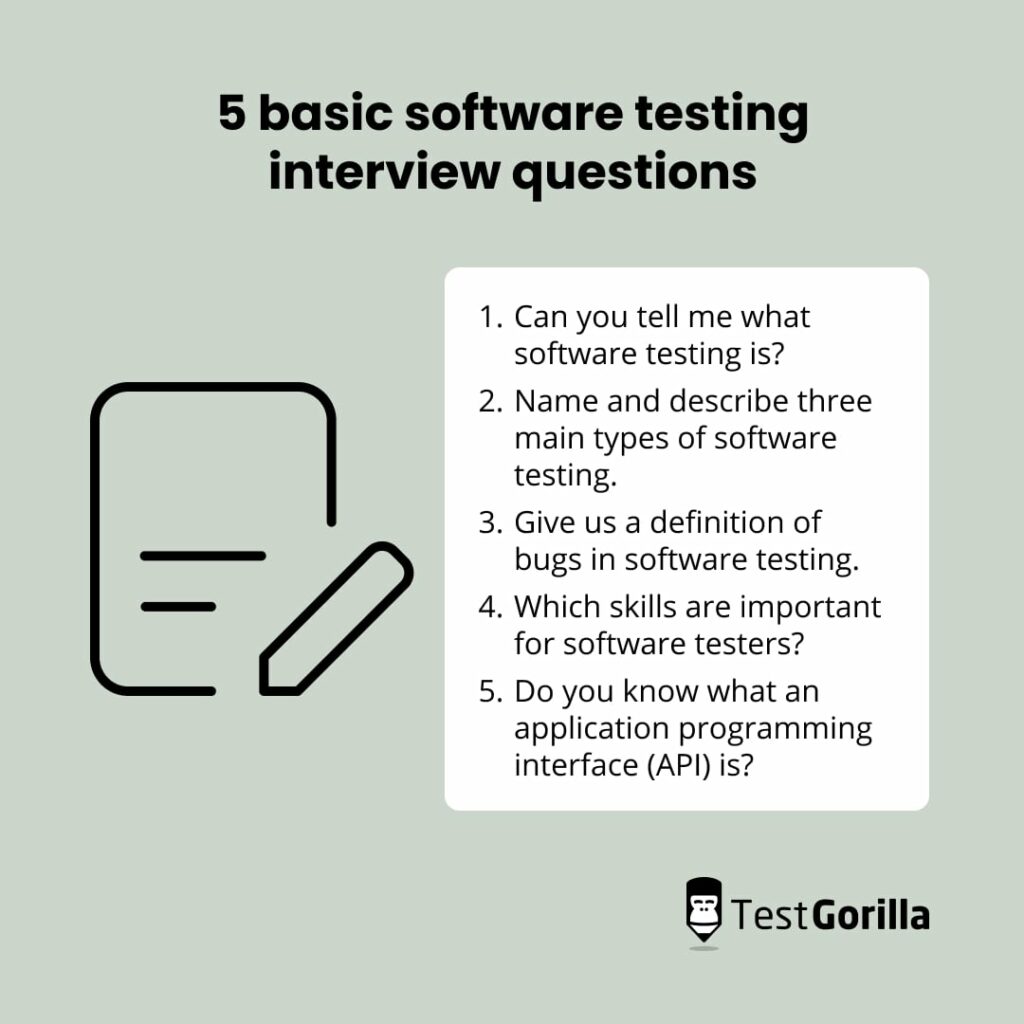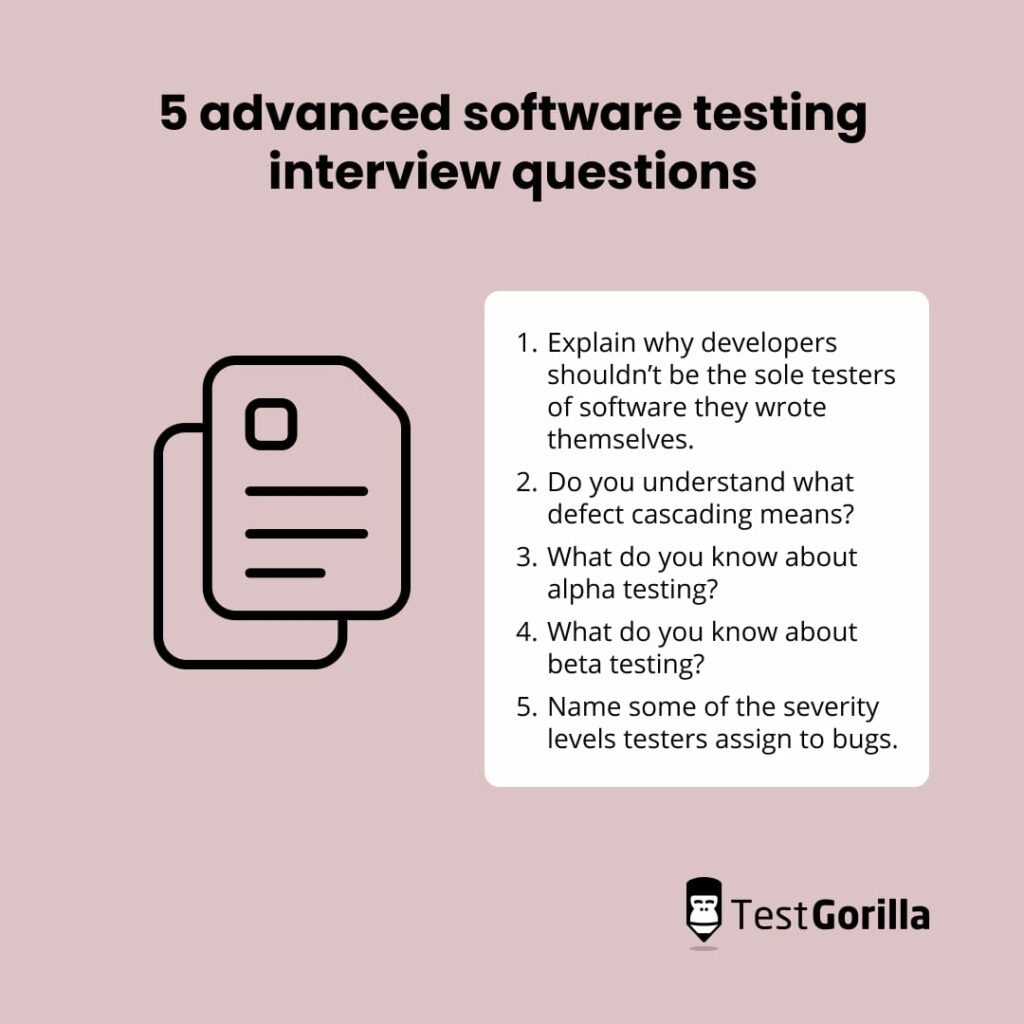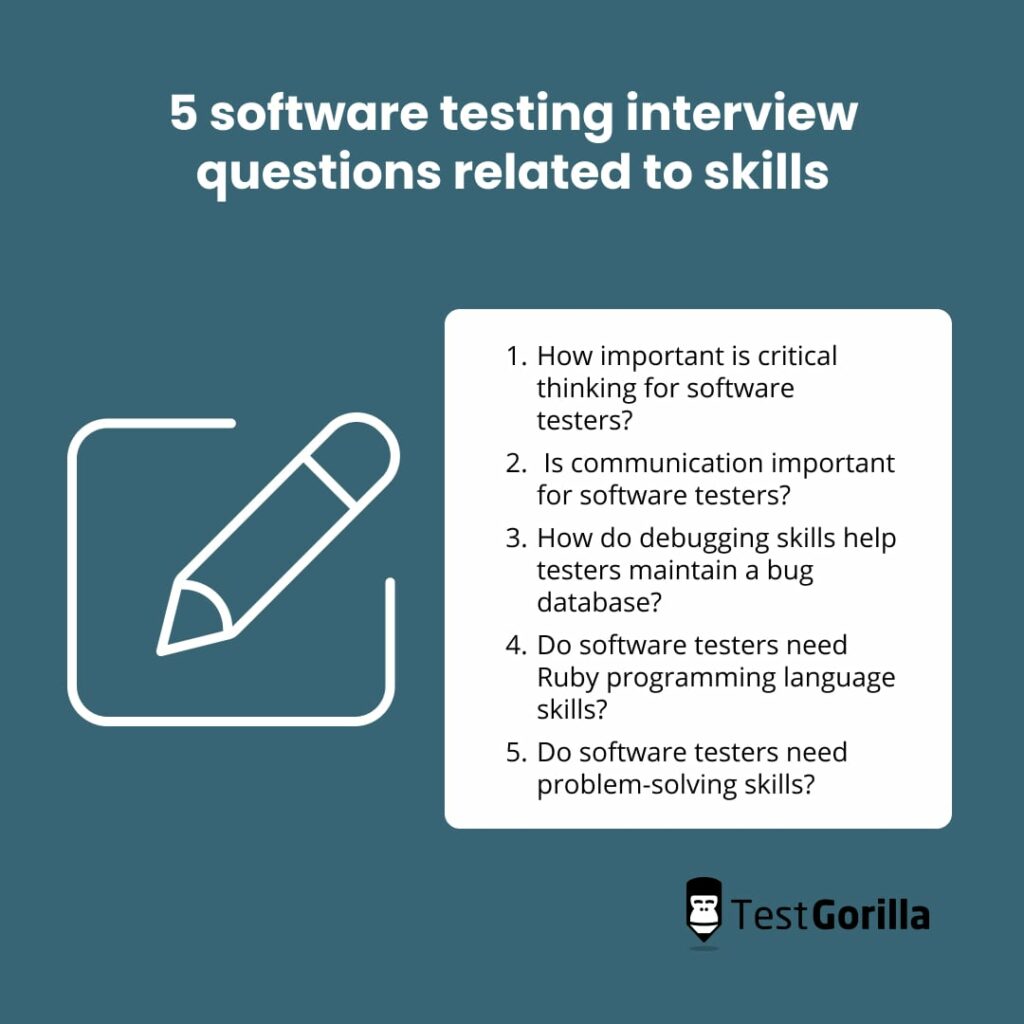72 software testing interview questions to ask professionals
Interviews give you the chance to exchange information with candidates about a technical testing role. They enable you to learn about the applicant and them to learn about the company in an engaging discussion.
One essential step you must take to keep candidates engaged in the interview is using insightful software testing interview questions.
It’s also crucial to use a data-driven method like our software tester tests to create an applicant shortlist. But how can you build a list of questions to assess your candidates?
The simplest answer is to look at this article’s 72 software testing interview questions. Read on for the best questions and the perfect tests to build an assessment for your candidates.
Table of contents
- 42 basic software testing interview questions to ask junior applicants
- 5 basic software testing interview questions and sample answers
- 25 advanced software testing interview questions to ask senior applicants
- 5 advanced software testing interview questions and sample answers
- 5 software testing interview questions and answers related to skills
- When should you use software testing interview questions in the hiring process?
- Use a data-driven method and software testing interview questions to hire a pro
42 basic software testing interview questions to ask junior applicants
If you need to hire a junior software tester, ask candidates some of these 42 basic software testing interview questions to review their knowledge.
Can you tell me what software testing is?
Name and describe three main types of software testing.
Do you know the main principles of software testing? Name three.
Tell me what you understand about regression testing.
What do you understand about the exploratory testing method?
Can you explain what unit testing means?
Tell me the main characteristics of good unit tests.
Do you know what an application programming interface (API) is?
Describe the functions and components of test environments.
Do you understand how test coverage tools work? Explain how they function.
What is the statement coverage testing technique?
What is the decision coverage testing technique?
What is the path coverage testing technique?
What is the function coverage testing technique?
Can you give us a definition of gray-box testing?
Which skills are important for software testers?
Why is automation testing using Agile models ideal in software testing?
What do you understand about test cases?
What do you understand about test scenarios?
What do you know about test scripts?
Give us a definition of bugs in software testing.
Is there a difference between errors and bugs? Explain your answer.
Explain what test plans are. Describe what they include.
Explain what test reports are. Describe what they include.
What do you understand about test deliverables or artifacts?
Do you know some examples of debugging categories?
Which common mistakes cause major issues for software testers?
Tell me what user stories are.
What is the Selenium tool?
What is the Protractor tool?
What is the Cypress tool?
What is the Jasmine tool?
What is the JUnit tool?
Can you give us a definition of defects in software testing?
What do you know about SPICE?
Tell me what latent defects are.
Tell me what masked defects are.
Define sanity testing in the context of software testing.
Can software testers skip a code block in TestNG?
Which syntax should you use to set priority for test cases using TestNG?
Do you know what object repositories are?
Name three steps to resolve issues during testing.
5 basic software testing interview questions and sample answers
Use these sample answers to five of the basic software testing interview questions to check if your candidates’ answers are accurate and correct.
1. Can you tell me what software testing is?
Software testing is a process in which testers evaluate whether software products function as developers expect them to. Testers check for defects to enhance the product’s quality and prevent bugs and other issues from reducing performance.
Consider whether applicants can provide a definition such as this to prove their knowledge, and ask follow-up questions about their software testing experience to verify it.
2. Name and describe three main types of software testing.
Candidates should be able to describe three main types of software testing based on their experience and work. The following are some examples they may provide:
Unit testing: This testing technique evaluates individual units of an application in isolation. Unit testing ensures that each unit functions properly before it is integrated into the rest of the system.
Performance testing: This type of software testing assesses a program’s stability and responsiveness under a given workload to make sure that it meets certain performance criteria.
Security testing: This crucial type of testing requires testers to find any security risks or vulnerabilities to ensure the system is secure from threats like unauthorized access and injection attacks.
3. Give us a definition of bugs in software testing.
A software bug is a defect that causes a program to behave in an unexpected way. Bugs can have a wide range of causes, from coding errors to unexpected interactions between different software components. Software testers must use various testing methods to identify bugs.
Debugging is the best approach to reduce coding errors in software, so check whether applicants can debug applications with our debugging skills tests.
4. Which skills are important for software testers?
This software testing interview question is key because it’s crucial to check if applicants have the skills to complete software testing responsibilities. Below are some skills that are important for software testers:
Project management skills: Candidates should know how to manage their projects, deal with roadblocks, and avoid miscommunications.
Analytical skills: Software testers need to understand how to analyze complex systems and check test results to identify bugs and security threats.
Time management skills: Applicants must be able to manage their time efficiently to meet deadlines and implement feedback.
Evaluating these skills is simpler than you might think – our Project Management test, Time Management test, and Attention to Detail skills test will help you assess your software testers’ abilities.
5. Do you know what an application programming interface (API) is?
An application programming interface (API) provides a means of communication between one software component and another. It acts as an interface that both components understand. Software testers can also use APIs to provide data or additional functionalities to an application.
Some of the most popular APIs for business include the Google Assistant API, Alexa Skill Management API, and REST Countries API.
25 advanced software testing interview questions to ask senior applicants
If you’re aiming to hire senior software testers for your organization, ask candidates some of these 25 advanced software testing interview questions to see if their knowledge meets your requirements.
What do you understand about boundary value analysis?
How much testing should software testers complete?
Explain why developers shouldn’t be the sole testers of software they wrote themselves.
How is the software development life cycle related to software testing?
Do you understand what functional software testing means?
Do you understand what non-functional software testing means?
Can you explain what bug reports are?
Name three important testing metrics.
Why are testing metrics important for software testing?
Do you understand what test-driven development is? Give us an explanation.
What do you understand about cross-browser software testing?
Do you know what the information server response means? Give us a definition.
Explain what the success server response means.
Tell me what the redirect server response means.
Explain what the client error server response means.
Describe how you would map automation testing success.
Name some of the severity levels testers assign to bugs.
What do you know about alpha testing?
What do you know about beta testing?
Would you write test cases for white- or black-box testing first?
Give us a definition of test matrices.
Give us a definition of requirement traceability matrices.
Define validation in software testing.
Define verification in software testing.
Do you understand what defect cascading means? Give us a definition.
5 advanced software testing interview questions and sample answers
Refer to these five advanced software testing interview questions and sample answers to gauge your senior candidates’ expertise and testing experience.
1. Explain why developers shouldn’t be the sole testers of software they wrote themselves.
When it comes to software they write themselves, developers are not the best software testers for many reasons. Although developers perform some testing as they code, here’s why they should not be the primary testers for the software they wrote:
Typically, testers perform more comprehensive tests and use more sophisticated testing tools than developers
Though developers may check that the code works under normal loads and operations, they may fail to check for the many ways it may not work
Programmers may be biased toward their software and not be able to take on the user’s perspective
However, applicants should know that developers should still perform some testing processes to find bugs and programming errors, which testers may struggle to find without the source code.
2. Do you understand what defect cascading means? Give us a definition.
Defect cascading refers to when a single defect causes many other issues in a program. When testers fail to notice or report a defect, it can trigger more problems and cause multiple defects to appear later in production.
3. What do you know about alpha testing?
Senior candidates should know that alpha testing is one user acceptance testing phase. They should explain the main goal of this type of testing – to identify bugs before clients use the software. Therefore, testers complete this process before they ship the program to their clients.
4. What do you know about beta testing?
Beta testing is one of the final phases of user acceptance testing and occurs after alpha testing. The process requires testers to complete tests in a real production environment. Check if your applicants understand the advantages of beta testing, such as the potential to receive helpful feedback from real clients.
5. Name some of the severity levels testers assign to bugs.
Testers must identify bugs to fix errors in the codebase and ensure the software functions efficiently. Therefore, they should know the different severity levels to assign each bug. Here are a few examples of severity levels candidates may mention:
Low severity: This level is assigned to user interface bugs and issues with accessibility.
Medium severity: Testers may assign this severity level to leaky abstractions, unresponsive software (known as hangs), or situations when users cannot perform a specific action.
High severity: This level includes software crashes due to high loads, calculation errors, actions that make the software crash, sensitive user data exposure, security issues, and data loss.
5 software testing interview questions and answers related to skills
To learn about your applicants’ testing-related abilities, ask them these five software interview questions about skills, and review their responses using the sample answers.
1. How important is critical thinking for software testers?
Software testers must identify software defects using deductive reasoning, a key critical thinking subskill. Critical thinking is also important for software testers who develop strategies for testing software and need to:
Complete requirement analyses
Analyze the design and spot design inconsistencies
Report bugs and recognize the key information about critical defects
Check this skill with our Critical Thinking skills test before hiring a software tester for your business.
2. Is communication important for software testers?
Teams that communicate effectively are up to 25% more productive.
Software testers must collaborate with developers and team members, whether they communicate by email, video conferencing methods, or phone. They need to not only liaise with developers regarding bug reports but also explain technical requirements so that developers can take the right actions to resolve the bugs.
Do you need to assess your applicants’ communication skills? For a smooth skill-reviewing process, check out our Communication test.
3. How do debugging skills help testers maintain a bug database?
Top software testers will know that a bug database keeps track of issues and bugs. Testers use it to report and manage bugs they detect in software. A bug database helps testing and development teams track and deal with bugs in an organized way.
Consider whether applicants know how to work with a bug database, and ask for examples of how they have used one to improve the software development process.
4. Do software testers need Ruby programming language skills?
Some software testers use the Ruby open-source programming language to complete user interface test automation processes. This programming language is just one example of many that can help testers complete this task – some others include Python and C#.
To assess your applicants’ Ruby programming language skills, invite candidates to complete our Ruby skills test as part of a skills assessment.
5. Do software testers need problem-solving skills?
Software testers must solve complex testing challenges and manage issues using unique, innovative, and effective approaches. For this reason, problem-solving skills are vital for software testers, and you should look for them before you hire an applicant.
A data-driven approach can help you assess your applicants’ problem-solving skills. Simply include TestGorilla’s Problem Solving skills test in your candidate assessment.
When should you use software testing interview questions in the hiring process?
One golden rule to follow before you use software interview questions is to invite candidates to complete a software testing assessment. You should build the assessment using five skills tests, send an invitation to your applicants, review their scores when they finish all the tests, and create a shortlist of applicants.
With the skills assessments completed, you can then use the software testing interview questions to discuss your findings with your candidate. For example, if a candidate didn’t score well on the C# debugging skills test, you can ask them related questions to quickly determine if their skills match your expectations.
Use a data-driven method and software testing interview questions to hire a pro
Your winning combination for candidate assessment is simple and effective: Just use our skills tests and software testing interview questions to hire a pro.
With this approach, you can replace the resume screening method, keep time-to-hire metrics low, and remove unskilled applicants from the hiring process earlier.
Need more information on skills testing? Sign up for a free demo to learn how we can help you hire faster and more efficiently.
Become one of the 8,700 companies that favor skills testing with TestGorilla, and see how this process can enhance your hiring process. Try our platform for free today.
Related posts
You've scrolled this far
Why not try TestGorilla for free, and see what happens when you put skills first.
Latest posts
The best advice on pre-employment testing, in your inbox.
No spam. Unsubscribe at any time.

Hire the best. No bias. No stress.
Our screening tests identify the best candidates and make your hiring decisions faster, easier, and bias-free.
Free resources
A step-by-step blueprint that will help you maximize the benefits of skills-based hiring from faster time-to-hire to improved employee retention.
With our onboarding email templates, you'll reduce first-day jitters, boost confidence, and create a seamless experience for your new hires.
This handbook provides actionable insights, use cases, data, and tools to help you implement skills-based hiring for optimal success
A comprehensive guide packed with detailed strategies, timelines, and best practices — to help you build a seamless onboarding plan.
This in-depth guide includes tools, metrics, and a step-by-step plan for tracking and boosting your recruitment ROI.
Get all the essentials of HR in one place! This cheat sheet covers KPIs, roles, talent acquisition, compliance, performance management, and more to boost your HR expertise.
Onboarding employees can be a challenge. This checklist provides detailed best practices broken down by days, weeks, and months after joining.
Track all the critical calculations that contribute to your recruitment process and find out how to optimize them with this cheat sheet.

















